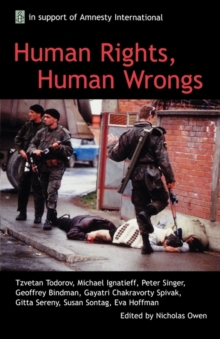
Land Rights : Oxford Amnesty Lectures Paperback / softback
Edited by Timothy (Lecturer in Modern Languages, Royal Holloway, University of London) Chesters
Part of the Oxford Amnesty Lectures series
Paperback / softback
Description
Indigenous peoples and governments, industrialists and ecologists all use - or have at some stage to confront - the language of land rights.
That language raises as many questions as it answers.
Rights of the land or rights to the land? Rights of the individual or rights of the community?
Even accepting that such rights exist, how to arbitrate between competing claims to land?
Spanning as they do a wide range of intellectual territory, and their spheres of interest or activity ranging geographically from the Niger Delta to Papua New Guinea, from Quebec to the Eastern Cape, the contributors to this volume move across a range of different, and at times contradictory, approaches to land rights.
Marilyn Strathern explores the divergent anthropologies of land, specifically regarding the equation of land and property.
Cree lawyer and spokesman Romeo Saganash and Frank Brennan, an Australian lawyer and priest, explore the legal framework for land claims.
The UN's International Decade of the Rights of Indigenous People recently ended in the failure of negotiating govemnents to accommodate, within international law, a 'collective' right to land.
It is only by acknowledging this collective right to self-determination, both argue, that governments can come to terms with their indigenous populations and their own colonial past.
Against the pleas of Brennan and Saganash, the Kenyan Richard Leakey, whose own history and politics is indissociable from that past, questions the whole notion of 'indigeneity'.
The campaigner Ken Wiwa speaks too of the difficulties of redressing historical injusticeis, especially in a region - the Niger Delta - where the indigenous Ogoni have no written record of their losses.
Finally William Beinart, a historian and advisor to the South African government, outlines some of the practical difficulties of land reform in that country.
Information
-
Out of stock
- Format:Paperback / softback
- Pages:240 pages
- Publisher:Oxford University Press
- Publication Date:15/01/2009
- Category:
- ISBN:9780199545100
Information
-
Out of stock
- Format:Paperback / softback
- Pages:240 pages
- Publisher:Oxford University Press
- Publication Date:15/01/2009
- Category:
- ISBN:9780199545100










